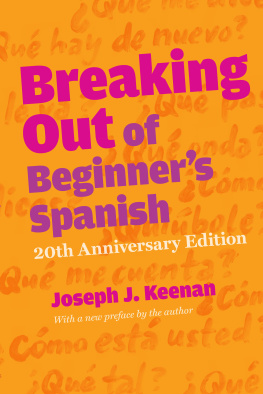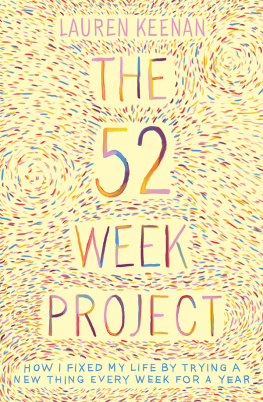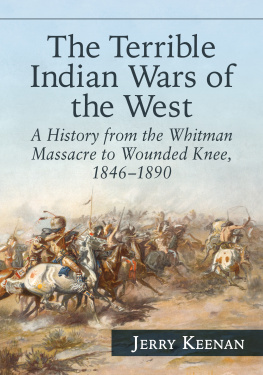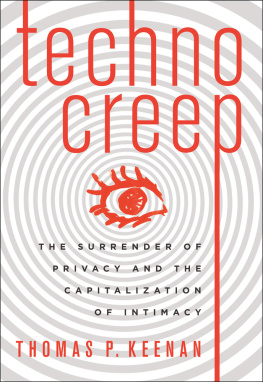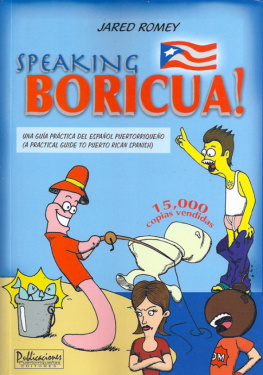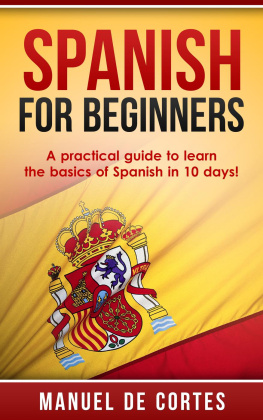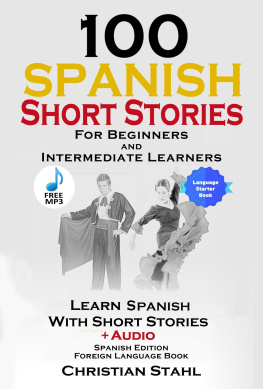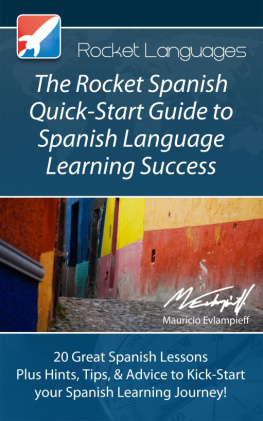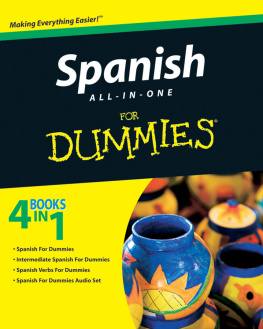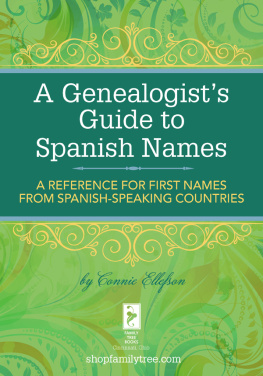Keenan - Breaking Out of Beginners Spanish
Here you can read online Keenan - Breaking Out of Beginners Spanish full text of the book (entire story) in english for free. Download pdf and epub, get meaning, cover and reviews about this ebook. City: Austin;TX, year: 2015;1994, publisher: University of Texas Press, genre: Home and family. Description of the work, (preface) as well as reviews are available. Best literature library LitArk.com created for fans of good reading and offers a wide selection of genres:
Romance novel
Science fiction
Adventure
Detective
Science
History
Home and family
Prose
Art
Politics
Computer
Non-fiction
Religion
Business
Children
Humor
Choose a favorite category and find really read worthwhile books. Enjoy immersion in the world of imagination, feel the emotions of the characters or learn something new for yourself, make an fascinating discovery.
- Book:Breaking Out of Beginners Spanish
- Author:
- Publisher:University of Texas Press
- Genre:
- Year:2015;1994
- City:Austin;TX
- Rating:3 / 5
- Favourites:Add to favourites
- Your mark:
- 60
- 1
- 2
- 3
- 4
- 5
Breaking Out of Beginners Spanish: summary, description and annotation
We offer to read an annotation, description, summary or preface (depends on what the author of the book "Breaking Out of Beginners Spanish" wrote himself). If you haven't found the necessary information about the book — write in the comments, we will try to find it.
Keenan: author's other books
Who wrote Breaking Out of Beginners Spanish? Find out the surname, the name of the author of the book and a list of all author's works by series.
Breaking Out of Beginners Spanish — read online for free the complete book (whole text) full work
Below is the text of the book, divided by pages. System saving the place of the last page read, allows you to conveniently read the book "Breaking Out of Beginners Spanish" online for free, without having to search again every time where you left off. Put a bookmark, and you can go to the page where you finished reading at any time.
Font size:
Interval:
Bookmark:
JOSEPH J. KEENAN

COPYRIGHT 1994, 2015 BY THE UNIVERSITY OF TEXAS PRESS
All rights reserved
First edition originally published 1994
Twentieth anniversary edition, 2015
Requests for permission to reproduce material from this work should be sent to:
Permissions
University of Texas Press
P.O. Box 7819
Austin, TX 78713-7819
http://utpress.utexas.edu/index.php/rp-form
The Library of Congress has cataloged the first editon as follows:
Keenan, Joseph J. (Joseph John), date
Breaking out of beginners Spanish / by Joseph J. Keenan.1st ed.
p. cm.
I. Spanish languageConversation and phrase booksEnglish. I. Title.
PC4121.K38 1994
468.2.421dc2o 94-4316
LCN 2014939227
doi 10.7560/761933
E-book ISBN: 978-0-292-76194-0 (library/institutional); 978-0-292-76195-7 (individual)
To Flavia Chica, Jos Andrs, and Adrin.
Thanks for all the lessons!
This book is not a phrasebook and not a textbook, though it can be used with either. It is more like a guidebooknot to the Spanish-speaking countries but to the Spanish spoken in those places. It shows you the dark alleyways, the bright meeting-places, the bohemian nooks, and the pulsing thoroughfares of the language. And it shows you more than a few shortcuts, guiding you toward the Spanish you want to learn. Like a guidebook, this books goal is to help you get around, whether youre in the boardroom or the barrio.
It is a helpful book, like a boy scout helping an elderly person across the street, and it is an irreverent book, like an impish schoolchild making faces at the teacher. It is a serious book and it is a funny book. It will tell you how to be polite to a grandmother and how to shock a gangster. It preaches Spanish with a smile, a strut, and maybe just a bit of an attitude. This book wants you to speak better Spanish, and it will stop at nothing, or almost nothing, to accomplish it.
Of course, no book can teach you how to speak Spanish. Only by practicandoand especially platicandocan you learn that. So why read it? Because, as you will soon see, this book makes learning Spanish more fun. And if learning Spanish isnt going to be fun, why bother?
Since this book was published twenty years ago, much has changed in the world of Spanish, and, paradoxically, much has not changed. Languages evolve, and watching them do so can seem like watching the grass grow... and yet the grass does grow, thick and lush.
In the past two decades Spanish has grown as well, adding new words. The self-appointed gatekeeper for this process, Spains Real Academia Espaola, periodically publishes updates of its colossal dictionary, each time placing its seal of approval on new Spanish words. In 2012, for instance, nearly 1,700 additions were made, led predictably by words from our ever-expanding world of computers: blog and bloguero, chat and chatear, USB and SMS, and teletrabajador. Also allowed through the gate were friki, sudoku, papamvil (Popemobile), orgsmico, and sushi. Other existing Spanish words had their meanings modified: matrimonio now officially extends to two people of the same gender (En determinadas legislaciones...), and tableta is now approved for your iPad. Those looking to study our cultural trends could do worse than following the Real Academias periodic absorption of new words.
One particular trend is captured in the official adoption by the Academia of the word spanglish (one suspects begrudgingly), referring to the unruly offspring of the brazen cohabitation of Spanish and English. It seems only fair to recognize the word, as it remains one of the principal parents of the many new words entering Spanish (and English) every single day.
The Spanish language itself has earned a certain new stature in recent decades, as popular culture beyond the Spanish-speaking world wakes up to its vigor and growth. Somewhere in the vicinity of half a billion people now speak the language, and by 2030 Spanish could be the language with the second-highest number of native speakers on the planet. Linguists estimate that by the year 2030, 7.5 percent of the global population will speak Spanishdwarfing such languages as Russian (2.2 percent), French (1.4 percent), and German (1.2 percent)and within three or four generations that may increase to 10 percent. The number of Spanish-speakers is growing fast even in places like Brazil, the Middle East, and Asia, according to some reports.
In the United States these trends have received even greater attention. Some analysts project current trends forward and conclude that by midcentury the United States will become the largest Spanish-speaking country on Earth, surpassing (perhaps) Mexico. The U.S. Census Bureau projects that the country will be home to 133 million Hispanics by 2050about 30 percent of the U.S. population and a roughly eightfold increase since this book was first published twenty years ago.
Is this a good time to mention that you might want to think about buying a cool book on learning Spanish... ?
Not all of the United States Spanish speakers are Hispanic (nor will all Hispanics necessarily be speaking Spanish several decades hence). According to a recent Pew Research Center analysis, some 2.8 million non-Hispanics speak Spanish at home in the United States today. And that may be the salient point in this stew of statistics: not that Spanish or Hispanics are taking over the United States, but that being bilingual is fast becoming commonplace in that country. This time bilingualism might just stick to the sides of the melting pot in a way that it never managed to during previous periods of U.S. history.
Whats (maybe) different this time?
For one thing, bilingualism is becoming fashionable. The popular press writes about how being bilingual keeps Alzeihemers at bay and makes your kids smarter. For these discoveries we have science to thank. It wasnt that long ago that the popular belief was that having to speak two languages was a handicap for children and made them learn more slowly. This belief expressed itself in centuries of misguided policies worldwide to prevent children from speaking a second language, usually their native one. But in recent decades the scientific consensus has swung around 180 degrees. Now it is widely accepted that being bilingual makes people smarter in ways that go far beyond language skills. As I write this, there is even a Wikipedia page dedicated to the Cognitive Advantages of Bilingualism, which concludes:
Results such as the ones from the above presented studies imply that each language has the ability to shape an individual's perception of the world, and that a balanced bilingual's perception of the world would change according to the language they were currently functioning in. This suggests the possibility of a processing superiority over monolinguals of the world around them, even more so when considering the research that implies a constant activation of both languages' phonological and grammatical rules as well as lexicons.
In simpler terms, bilinguals perform better on several cognitive and monitoring tasks and seem to enjoy a strengthening of the executive control center that helps us ignore distractions, keep focused on what is relevant, and solve problems. One test even showed that bilinguals were better able to drive while talking on a cell phone. In short, having and using a backup language is like taking a multi-tasking megavitaminjust what is needed in the growing complexity of our modern world.
Font size:
Interval:
Bookmark:
Similar books «Breaking Out of Beginners Spanish»
Look at similar books to Breaking Out of Beginners Spanish. We have selected literature similar in name and meaning in the hope of providing readers with more options to find new, interesting, not yet read works.
Discussion, reviews of the book Breaking Out of Beginners Spanish and just readers' own opinions. Leave your comments, write what you think about the work, its meaning or the main characters. Specify what exactly you liked and what you didn't like, and why you think so.

